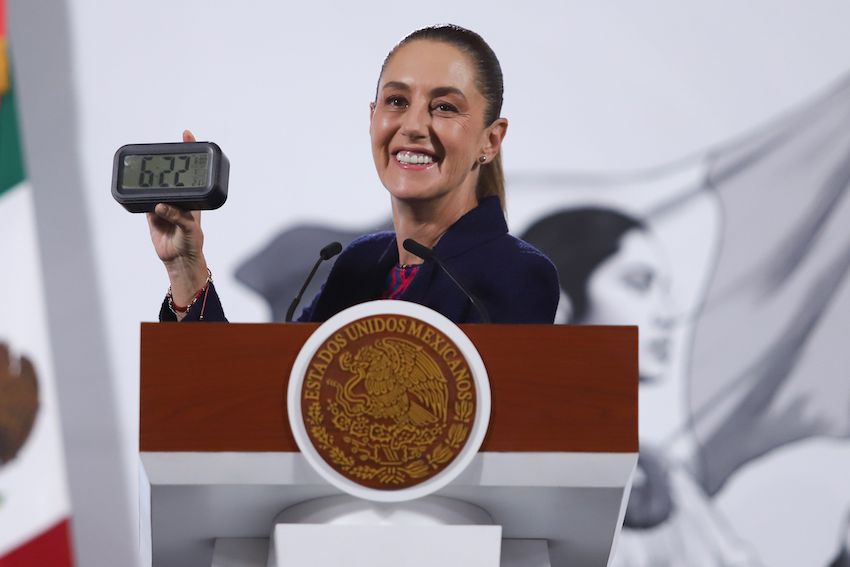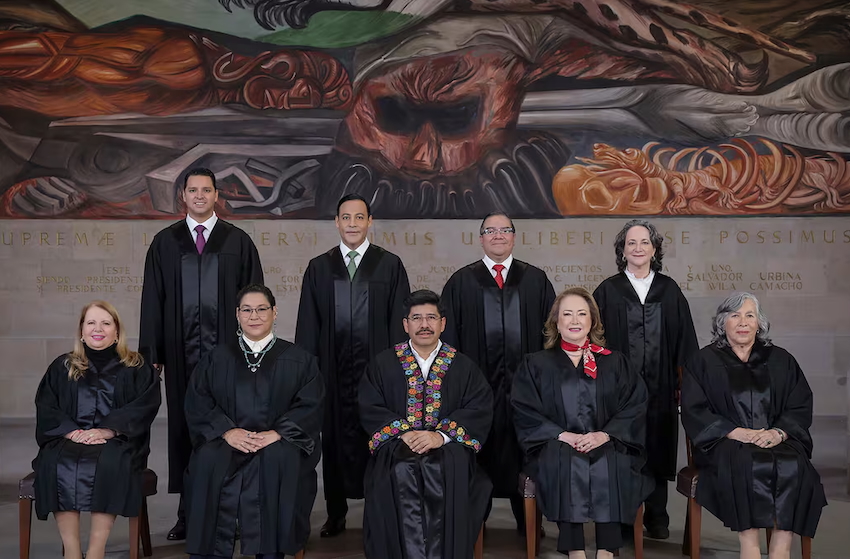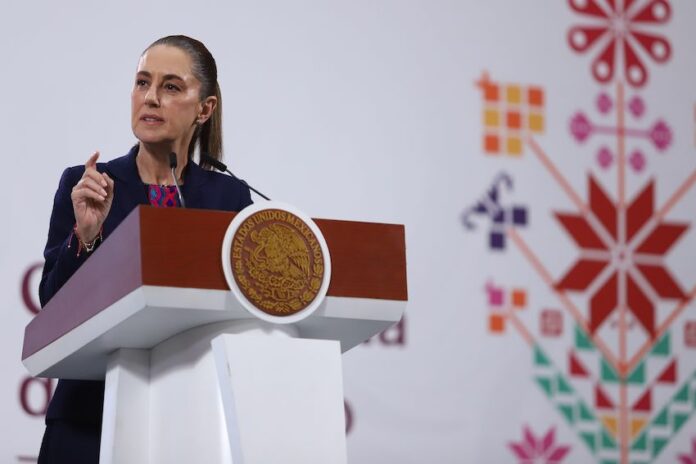Citizens’ perceptions of insecurity and the United States’ allegations that Mexico is not fully complying with the USMCA free trade pact were among the issues President Claudia Sheinbaum spoke about at her Wednesday morning press conference.
Here is a recap of the president’s Oct. 8 mañanera.

Homicides are down, but public fear of insecurity is up. Why?
A reporter noted that homicides have declined during Sheinbaum’s presidency, but the percentage of people who feel unsafe in the city in which they live has risen.
According to the results of the national statistics agency INEGI’s National Survey of Urban Public Security (ENSU) in the third quarter of 2024, 58.6% of respondents believed the city in which they live was unsafe. In the second quarter of 2025, the percentage was up more than four points to 63.2%, the highest level in three years.
Sheinbaum said that perceptions of insecurity “have to do with many aspects, many issues” beyond homicide numbers, which declined almost 25% annually in the first nine months of 2025. The ENSU considers things like whether people feel unsafe at the bank, on the streets they regularly use and on the highway, places where robberies are commonly committed.
Sheinbaum acknowledged that while homicides have declined, reported cases of extortion have increased.
For that reason, the federal government launched a new national strategy against extortion, Sheinbaum said.
She said that “telephone extortion” is a particular problem in some parts of the country.
Authorities launch national strategy against extortion to tackle a pernicious and widespread crime
Attempts at extortion over the phone “don’t necessarily” result in “fraud” or people paying money to extortioners, but do generate fear among the population, Sheinbaum said.
She said that another factor that causes people’s perception of insecurity to increase is that “a lot of media outlets” exaggerate “issues of violence,” which generates “an environment” in which people think “there is a lot of insecurity in the country.”
Therefore, the increase in the number of people who consider their city unsafe “also has to do with the kind of communication” employed by “traditional media outlets,” and by “some [television] channels in particular,” Sheinbaum said.
“… Now we [also] have social media and the fake news that is created on social media. So obviously we have to inform from here,” she said, referring to her mañanera lectern.
Sheinbaum: The new judiciary will aid the quest for peace
Sheinbaum said that her government will continue to work “every day” to improve public security in Mexico.
“Regardless of the [anti-government] campaigns, regardless of what appears on social media, we’ll work and listen to the people to continue providing peace and security,” she said.
“And I’m sure that the new judiciary will help us a lot,” Sheinbaum said.

Mexico held its first-ever judicial elections in June, and the successful candidates assumed their positions on Sept. 1.
Sheinbaum argued that the elections were needed to renew the judiciary and thus rid it of corruption and other ills.
Mexico’s USMCA compliance ‘problems’
A week after United States Trade Representative Jamieson Greer accused Mexico of failing to comply with the USMCA free trade pact, Sheinbaum said there are “about 50 points raised by the United States regarding what they consider to be ‘Mexico’s problems’ with the trade agreement.”
She said that her government is “clarifying” the situation regarding the alleged compliance problems because reality doesn’t “necessarily” match “the view they have.”
“I’ll give you an example,” Sheinbaum continued.
“In the case of labor, they say that there aren’t enough resources for [Mexico’s] labor courts. They were only counting the budget that the federal government provides, but each state of the republic provides a budget to its own courts. If you put it all together, it’s more than 4 billion pesos [US $218.2 million],” she said.
“So issues like those are simply clarified and resolved,” Sheinbaum said.
She said that her government doesn’t agree with some of the United States’ other USMCA complaints, but is reviewing them nonetheless.
“At least from our point of view, the majority have already been resolved,” Sheinbaum said.
She noted that the “formal review” of the USMCA — scheduled for 2026 — hasn’t commenced, but acknowledged that Mexico and the United States have started public consultation processes.
Sheinbaum also noted that the United States has imposed tariffs on some imports from Mexico, such as vehicles and steel, but stressed that “the majority” of the USMCA is being respected by the U.S. government.
She expressed confidence that the outcome of the USMCA review will be positive for Mexico, even though U.S. President Donald Trump has indicated that he wants to renegotiate the pact that superseded NAFTA in 2020.
“We believe that we’ll do well. We’re optimistic,” Sheinbaum said.
By Mexico News Daily chief staff writer Peter Davies ([email protected])
